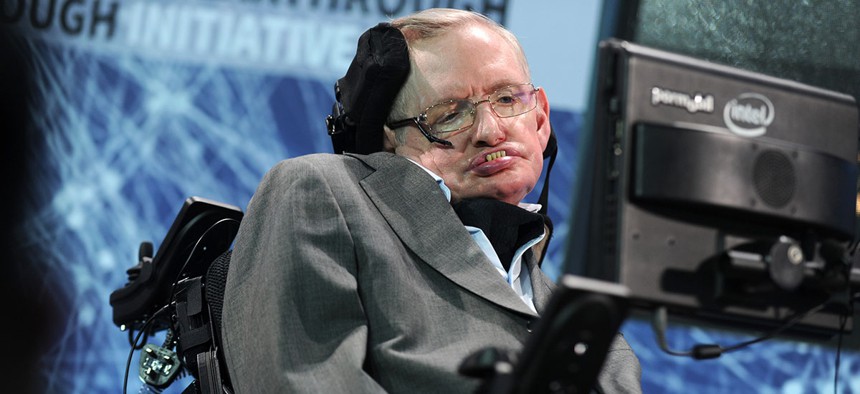AI Gave Stephen Hawking the Ability to Communicate, Despite His Fears of the Tech

Cosmologist Stephen Hawking Hoo-Me.com/MediaPunch/IPX/AP
He was known for his skepticism of developing “strong AI."
For the last 10 years of his life, Stephen Hawking communicated only by tensing his cheek.
The famed physicist, known for his theories on black holes and for surviving ALS far longer than doctors’ estimates, wore a device on his glasses that monitored whether his cheek was flexed or not, and used the signal as a mouse-click to control his computer. When he first adopted this method, which one of his graduate students introduced in 2008, it was painfully slow and prone to error. It relied on a program called Word+ in which sentences had to be typed letter-by-letter, according to Wired.
Artificial intelligence helped make the system faster. Frustrated with the speed at which he could communicate, Hawking reached out to Intel, which had in the past provided him with the computers he used to speak. The company sent a team to Hawking, and after years of testing new systems, worked out a solution with smartphone keyboard company SwiftKey, called ACAT (Assistive Contextually Aware Toolkit).
The new software’s typing program relied on a machine learning algorithm that had been trained on Hawking’s work; Swiftkey and Intel showed the algorithm the physicist’s past lectures and books to help it predict what words he was about to type. For instance, when he typed “the,” the word “black” and then “hole” would appear as options, according to Wired. This improved Hawking’s typing speed from his previous one or two words per minute, giving him the ability to speak conversationally in pop culture jaunts like Last Week Tonight with John Oliver.
Despite the help machine learning gave Hawking in communicating, the physicist was somewhat pessimistic about the technology’s potential impact on society. He was known for his skepticism of developing “strong AI,” or general artificial intelligence, that would have similar reasoning capabilities as a human.
“We should shift the goal of AI from creating pure undirected artificial intelligence to creating beneficial intelligence. It might take decades to figure out how to do this, so let’s start researching this today rather than the night before the first strong AI is switched on,” Hawking wrote in his final Reddit Ask Me Anything thread.
His argument was that it would be difficult to predict what an AI that was able to evolve itself would want, presuming that it would naturally be predisposed to gather more resources to sustain itself. In that case, it would rival humans for the finite amount of resources on the planet.
But even if evil AI were averted, Hawking still saw a problem with autonomous technology: Wealth distribution.
“If machines produce everything we need, the outcome will depend on how things are distributed,” he wrote on Reddit. “Everyone can enjoy a life of luxurious leisure if the machine-produced wealth is shared, or most people can end up miserably poor if the machine-owners successfully lobby against wealth redistribution. So far, the trend seems to be toward the second option, with technology driving ever-increasing inequality.”





